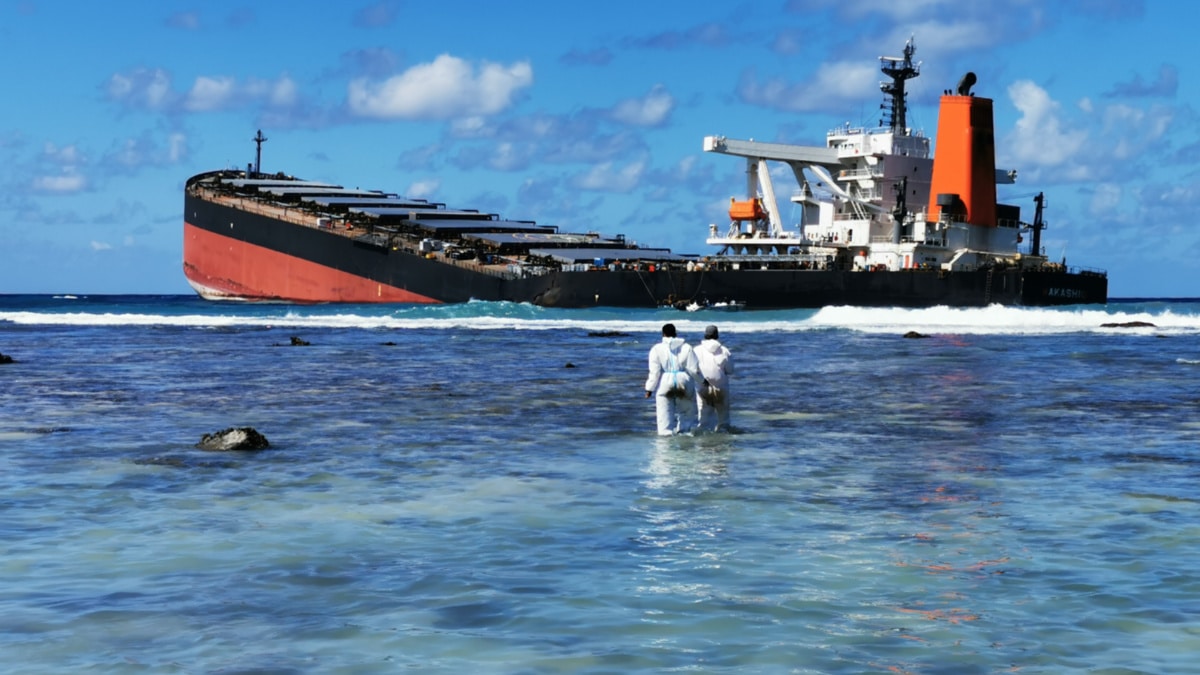
The Mauritius Oil Spill Cannot Be Cleaned Up, but Damages Must Be Paid

International Maritime Organization workers in hazmat suits stand in surf near the wreck of the MV Wakashio on August 13, 2020. imo.un / Wikimedia Commons / CC by 2.0
By Roshan Rajroop, Melita Steele and Hisayo Takada
Oil spills make visible the huge price being paid by the environment, wildlife and human communities for our reliance on fossil fuels. They are a harsh demonstration of the fragility of our oceans. They are a sad reminder of how urgent it is that we end our addiction to fossil fuels and make the transition to alternative renewable energy sources.
On the 25th of July the Japanese bulk carrier MV Wakashio — chartered by Mitsui OSK and owned by Nagashiki Shipping — struck a beautiful and irreplaceable coral reef on Mauritius’ southeast coast. The ship was sailing dangerously close to the reef, and ran aground. Twelve days later, the ship began leaking heavy fuel oil, devastating one of the most beautiful places in the world and ruining the livelihoods of coastal communities.
Over the past five weeks in Mauritius, we have witnessed long stretches of ocean, unique mangroves and pristine lagoons become quickly coated with oil. We have watched the people of Mauritius rushing to the beach, risking themselves as they attempt to remove the oil from every rock and grain of sand, desperately trying to recapture their homeland’s beauty submerged by toxic waves, being brought relentlessly by the tide to the shore. Our hearts went out to the families of seamen who lost their lives in a salvage operation. Thousands of species around the pristine lagoons of Blue Bay, Pointe d’Esny and Mahebourg are at risk of suffocating or drowning in a sea of pollution, with dire consequences for Mauritius’ tourism, and people’s food security and health.
Furthermore, some of the most toxic components of the oil spill can build up as hidden contaminants in marine organisms, through which they can enter into the food-chain. Oil residues accumulate in sediments, especially on shores. The impacts of this oil spill — like any other oil spill — will be felt years after the surface oil has been removed. The people of Mauritius are going to have to live with this devastating reality for decades.
There is no question that Mitsui OSK and Nagashiki Shipping are jointly the cause of the devastating pollution in Mauritian waters. After the first 12 days of their silence, Mitsui OSK and Nagashiki Shipping apologized for this disaster. For that apology to mean anything, it must be backed up with action. This would require fully applying the “polluter pays” principle, which means the companies pay for all current and future damages.
At the same time, emerging reports suggest that the Japanese and Mauritian governments have entered into talks for the Japanese government to provide a mere 3.6 billion yen (almost 34 million USD) to the Mauritian government to support the local fisherfolk who have been impacted by the spill.
While steps by the Japanese government to help the government of Mauritius cope with the toxic impacts of the oil spill are welcome, Japanese taxpayers should not be liable for the actions of the Japanese companies, which were reckless enough to allow one of its largest vessels to travel so close to coral reefs and run aground. Ultimately, those who are responsible for the pollution must pay for the damage that their pollution has caused. Mitsui OSK and Nagashiki Shipping seem to be avoiding their responsibilities.
The “polluter pays” principle would require funding, among other things, a fully public independent investigation into the causes and consequences of the oil spill, and a commitment to stop using this shipping route.
This needs to account for the livelihoods of those dependent on fishing and tourism, the coral reefs, mangroves, wetlands and the entire, vulnerable ecosystem. A recent announcement by Mitsui OSK shows a positive early sign as it resolves to address the damages the company caused with a long-term view toward recovery. This goes beyond the charterer’s liability, and the social responsibility of the company involved is clearly required in a case like this.
It is impossible to completely hold a company accountable through the law alone. The legal framework for environmental issues is under development. For this reason, Mitsui OSK and Nagashiki Shipping must proactively commit to their social responsibility, rather than taking advantage of legal loopholes.
Most importantly, Mitsui OSK and Nagashiki Shipping should use this disaster as an opportunity to finally break away from fossil fuels and to shift toward sustainable renewable energy. The two companies should give up transporting coal, oil and gas. Specifically Mitsui OSK should end any involvement in oil and gas production, including around LNG.
If it weren’t for fossil fuels, none of this would have happened. Companies producing, carrying and burning oil would like us to think that with enough goodwill it can be cleaned up, like milk spilled on the kitchen floor. Unfortunately, that is not the case.
In addition to threatening the biodiversity of the oceans and the livelihoods of coastal communities, our use of oil is a driver of the global climate crisis. The world’s foremost climate scientists have warned that we must urgently and radically minimize the use of oil, gas and coal in order to avoid the worst impacts of the climate emergency. The climate crisis is an existential threat and in response to it, there is a movement of millions of people across the world who are taking action. This oil spill is a tragic and devastating reminder that fossil fuels are toxic, and our reliance on them puts both people and the planet at risk. Now is the time to build a better future.
Roshan Rajroop is the President of human rights organization Dis Moi. Melita Steele and Hisayo Takada are the program directors for the environmental organization Greenpeace Africa and Greenpeace Japan.

 233k
233k  41k
41k  Subscribe
Subscribe 